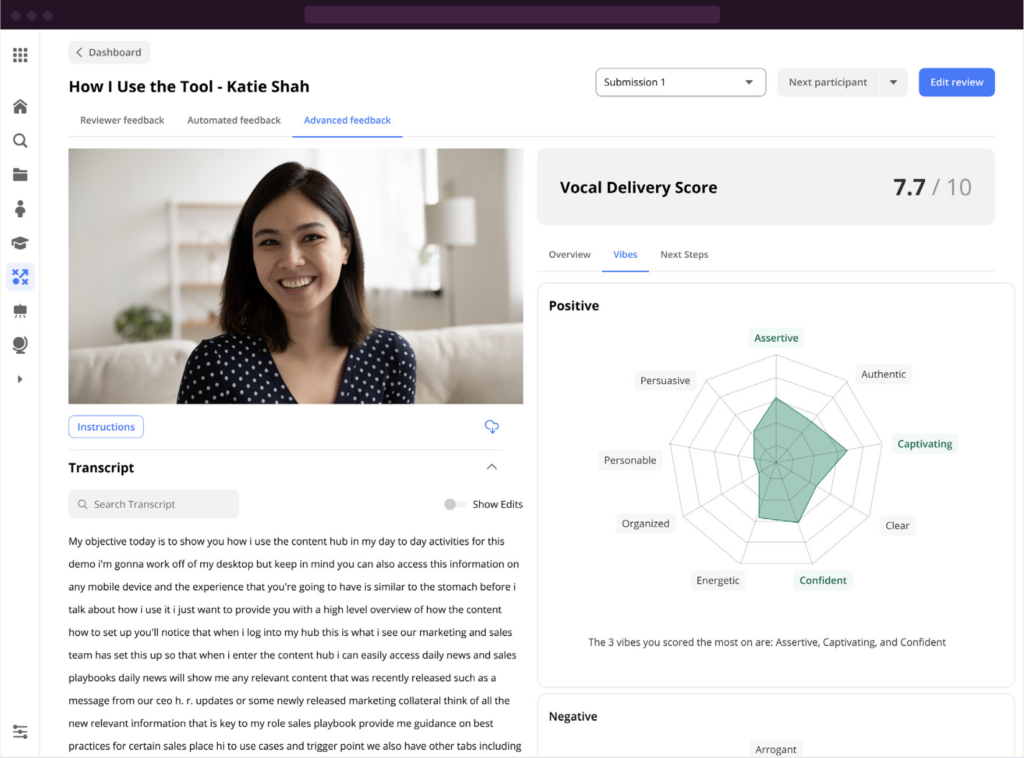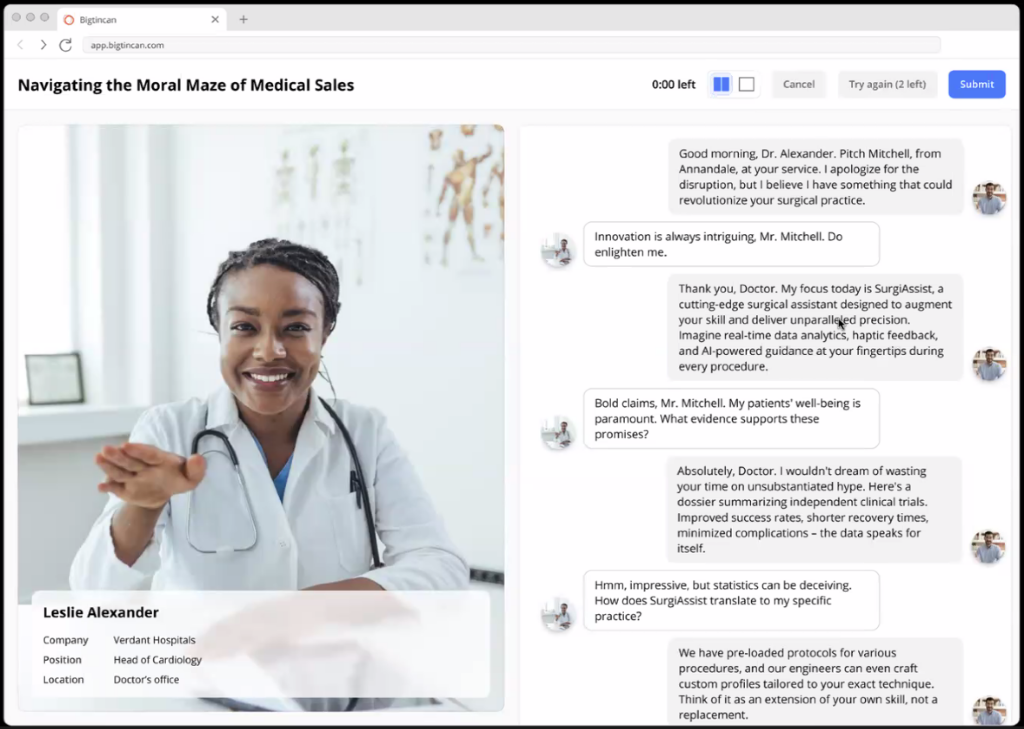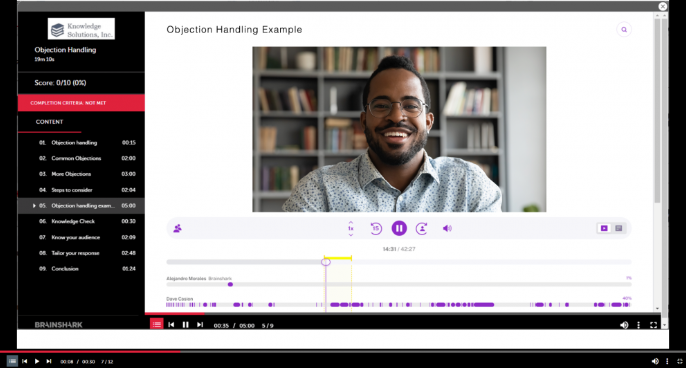Salespeople need to retain a lot of information and master the right sales skills to consistently hit their numbers. Reps constantly need to develop their product and market expertise, learn new company messaging and value propositions, and hone conversational skills to have more meaningful interactions with buyers.
An effective sales readiness strategy is essential to their success. With training and coaching to support the development of critical sales skills, organizations can equip their sellers to close more and bigger deals, all while ensuring time with buyers is well-spent.
But all of this begs a fundamental question: which skills are most important for your sellers to master?
The answer, of course, varies based on role, industry, and the buyers you’re targeting. (Selling to local SMBs is very different from selling to Fortune 100 executives, for example.) However, some skills are valuable in any situation. Here are 17 sales skills every rep needs and tips for helping your teams develop them.
Essential sales skills every rep needs
- Communication
- Prospecting
- Discovery
- Business Acumen
- Social Selling
- Storytelling
- Active Listening
- Objection Handling
- Presentation Skills
- Negotiation Skills
- Territory Management
- Technology
- Buyer Research
- Time Management and Planning
- Curiosity
- Judgment
- Collaboration
Download the blueprint for better sales onboarding to develop a plan that ensures reps not only complete their onboarding but master key competencies and guarantee long-term results.
Customer-facing sales skills
1. Communication
Strong communication skills are the foundation of building meaningful relationships with clients, setting expectations, and (tactfully) discussing a buyer’s pain points.
It may seem obvious, but it’s important to remember how communication is about much more than just speaking clearly and concisely. It includes:
- Writing and presentation abilities, which are needed when interacting over email, social media, video conference, or in-person.
- Forming and maintaining connections. Salespeople must communicate effectively throughout the sales cycle, from cold outreach and follow-up to moving an opportunity along.
Quick Tip: Leverage video coaching assessments to test whether reps can articulate value messaging. AI-powered conversation analysis can then detect the right emotions, word usage, and rate of speech.

2. Prospecting
Unfortunately, we’ve all experienced poor sales prospecting. To be effective, salespeople need to develop a strategic approach to prospecting and work on it daily to identify new business opportunities better. That means having the ability to research potential buyers, conduct cold outreach, and create new opportunities.
Quick Tip: Consider organizing your onboarding or training curriculum to keep reps focused on mastering skills for a specific sales activity (such as prospecting) before moving on to training for their next action.
3. Discovery
Can your sales reps ask intelligent questions, identify buyer needs, and follow up accordingly?
Today’s reps must be able to gain an excellent understanding of any prospect’s company, business challenges, and current priorities. Asking well-informed questions can help identify pain points, desired outcomes and give your organization a greater sense of the buyer’s political hierarchy.
Quick Tip: If your reps aren’t uncovering enough of the correct information on discovery calls, a peer learning strategy can help. You can document and distribute tips and tricks for discovery from your A-players and incorporate them into your training content.
4. Business Acumen
Whether you are trying to understand an annual financial report or the factors affecting your customers, the basics of good business are always critical.
Salespeople should use business-level information (like financial statements) to move a conversation forward around relevant pain points and ROI.
Quick Tip: Leverage subject matter experts – such as a finance team member or an experienced executive – who can provide you with the expertise needed to create related training content.
5. Social Selling
Your salespeople don’t need to be experts on the latest social media trends. Still, they should at least know the basics of using major networks like LinkedIn.
Reps should also understand what is and isn’t acceptable for engaging prospects on social media. You want to make sure sellers aren’t copying and pasting your sales pitch into every direct message or posting on LinkedIn five times a day. Personalized outreach coupled with a steady presence is critical.
Quick Tip: Create a training course to teach reps how to deliver effective messaging on social media and identify ideal buyers. Your sales enablement strategy should also include a documented social selling plan so reps can reference it as they learn.
6. Storytelling
You might think storytelling is just a component of good communication. But it’s a distinct skill because it requires reps to be clear and concise and engaging, and authentic. An authentic story will:
- Help your company stand out in the minds of buyers
- Appeal to buyers’ emotions and encourage action
- Help buyers see how “like” clients have solved similar challenges with your solution
To develop this skill, you should coach reps on telling stories, especially how to use case studies, research, and other proof points adding to the story’s credibility. For instance, ask reps to deliver a relevant narrative to a prospect in a critical market. Your feedback should point out whether your sellers used appropriate content and whether the delivery came across as genuine or “sales-y.”
7. Active Listening
It’s no secret reps need good listening skills to connect with clients. But in today’s fast-paced business world, there’s always a temptation to formulate a response or follow-up question before the buyer finishes talking.
Active listening is all about staying in the moment and ensuring the seller clearly understands what the buyer is saying. Reps can paraphrase what was just said or slow the conversation down as needed to ensure they can genuinely position themselves as consultative sellers.
Quick Tip: Use role-plays either in person or using roleplay AI technology to help reps improve their listening skills and become trusted advisors to customers. For example, have someone act as a potential customer describing their business challenges, and then ask reps to summarize the information to see whether they understand key points.

8. Objection Handling
Sales objections are a fact of life for reps. When approached the right way, they provide sellers with a valuable opportunity to ask more questions. An objection managed poorly, however, can derail an otherwise good conversation.
The key is to ensure your sellers, at minimum, understand how to respond to the major types of sales objections, such as skepticism (is your solution scalable at our fast-growing company?) or indifference (we don’t need what you provide).
Quick Tip: Design coaching activities to enable reps to practice responding to your company’s most common objections on video and then review them to provide feedback.
Don’t have the right sales coaching tools or culture yet? Build the business case and playbook for data-driven sales coaching to start making serious changes (for the better) at your company.

9. Presentation Skills
Sales reps deal with the unexpected every day, making it even more important they nail what they can practice ahead of time. Sales presentations and demos certainly fall into this category.
Many sales presentations become too feature-centric when they should focus more on the buyer’s challenges and needs. The presentation content and the sales message delivery need to be engaging and informative – or else you risk putting your buyers to sleep or, worse, losing them altogether.
Quick Tip: Managers can evaluate reps’ presentations via screen recording capabilities or by sitting in on calls and providing feedback afterward. Reps can also practice their presentations and get feedback on their own time and avoid over-burdening managers by using sales coaching and conversational intelligence tools.
10. Negotiation Skills
After building a proposal, reps must lead a disciplined negotiation process. High-stakes negotiations can often lead reps to make errors, such as offering a too steep discount.
Quick Tip: Consider role-playing exercises involving a hypothetical buyer who is pushing for price concessions or has deal demands specific to your industry. You’ll want to examine a rep’s ability to protect the value of a sale and highlight the advantages that only your solution provides.
Non-Customer-Facing Sales Skills
11. Territory Management
Reps’ ability to understand the market factors affecting their target accounts is critical to maximizing a high-potential territory.
Ensure your sales reps are engaged in the right messaging based on their territories. (For example, a territory full of growing tech startups would want to hear how your solution can help expand their businesses.)
12. Technology
Experience using new technologies has quickly become vital for sellers, and the trend isn’t going away anytime soon. Reps must know how to take advantage of various sales tools, whether it’s call intelligence or conversational marketing software, your CRM, or a sales readiness platform.
Of course, technical knowledge shouldn’t entirely fall on the sales team. Your reps should know enough to ask the right questions of sales engineering and IT as needed.
13. Buyer Research
Knowledge is power, and it can be a true differentiator. Reps need to be up to speed on different buyers, market trends, and the competitive landscape. Through the research of specific buyers and companies, you can better identify potential sales triggers.
A company who just doubled its headcount, for instance, is probably dealing with a lot of growing pains! Reps who actively use social media, news articles, public financial documents, or even your CRM will deliver a much more personalized and, therefore, relevant sales experience.
Quick Tip: Show salespeople how and where they can find relevant research and news articles about your target industries and incorporate those tips into your training content. To ensure reps understand how to use the information correctly, they can complete a video coaching assessment to share how they used research to enhance a sales interaction.
Soft sales skills and traits
14. Time management and planning
There’s only so much selling time in the day. Good salespeople can make the most of the buyer’s time and their own.
Specifically, reps should have a clear sense of the specific steps needed to close each deal and how long each step typically takes. If a client is requesting product information or thought leadership content, they should respond promptly. And as priorities change, they should know how to shuffle their day-to-day activities accordingly.
Quick Tip: Use one-on-one, informal coaching to go over the rep’s time management and planning strategies together. If you notice opportunities for improvement, coach the rep on making their plan more efficient and prioritizing tasks effectively.
15. Curiosity
Curiosity sends the message the rep is not solely focused on making a sale. Instead, they are interested in the buyer’s challenges. Great sales reps are inquisitive and willing to understand the “why” behind the client’s pain points.
16. Judgment
Sales reps have to make quick decisions constantly. Ensuring they’re savvy enough to make the right call is critical.
If a call is in danger of going off the rails, for instance, can your sellers read the vibe the buyer is giving off? Are they catering to the client’s preferences in terms of communication style? Do they have a good understanding of where the buyer is in the decision cycle? There won’t always be someone there to hold your reps’ hands; they need the ability to make those judgments in real-time, on their own.
Quick Tip: Although some reps innately have this skill, others may need some help. Sharing the best practices of your star salespeople through a formalized peer learning program can be a good starting point.
17. Collaboration
Complex B2B sales cycles require reps to be good orchestrators of people and resources. After all, many deals now involve multiple buyers and a handful of internal teams, such as sales ops, marketing, customer success, and legal.
Team players who can advocate on the customer’s behalf and get the right people involved in each sales process are more likely to achieve positive results. Also, you’ll want to make sure reps can collaborate internally to plan and deliver compelling business proposals to your clients.
Want to start developing these skills now? Get Sales coaching activities and prompts you can use right now (and forever).
Some sales skills are important regardless of role, industry or target buyers. Here are 17 key sales skills all reps should have.
